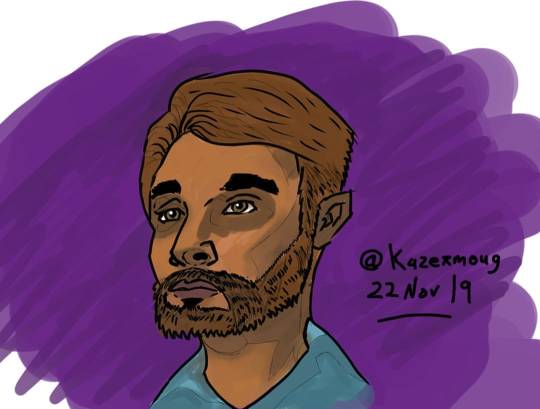#teachingyourself
Explore tagged Tumblr posts
Photo

Completed this morning. Going to prepare for the next week #dailydrawinghabit #learningtoimprove #learningdigitalart #learningtodraw #drawingfromreference #digitalpainting #clipstudiopaintpro #inkingpractice #digitalsketch #threequarterview #portaitsketch #illustrationpractice #earlymorning #planprepproduce #pencilkings #kazexmoug #artstudy #drawingisfun🎨 #drawdaily #teachingyourself#learningtocreate #warmtones #completed https://www.instagram.com/p/B5KjhctpsD0/?igshid=p83ybuq0gpo7
#dailydrawinghabit#learningtoimprove#learningdigitalart#learningtodraw#drawingfromreference#digitalpainting#clipstudiopaintpro#inkingpractice#digitalsketch#threequarterview#portaitsketch#illustrationpractice#earlymorning#planprepproduce#pencilkings#kazexmoug#artstudy#drawingisfun🎨#drawdaily#teachingyourself#learningtocreate#warmtones#completed
0 notes
Text
New Year, New Outlook
Originally published in Our Independence, January 2014.
By Esther Hofknecht Curtis, CBIS
When we make New Year’s resolutions, we really, really mean to keep them. We say, “Next year, things will be different.” We make lofty, abstract goals like, “I’ll work out more often,” or “I’ll eat more green vegetables” or the ever-present well-intended, “I’ll lose 30 pounds.” We promise that we will do this. It will be different. We swear. And we believe ourselves.
A resolution is defined as “a firm decision to do or not to do something.” There’s an essential problem with that: our bodies and minds don’t have switches and knobs that allow us to turn off our desire or need for something. As a former smoker, I know how difficult it is to quit. “Just one more,” says a little voice inside your head, “One more won’t make any difference at all.” It’s when we are alone, when no one is watching us, that it is most difficult to keep our resolutions. You are accountable for your actions; you can let yourself slide and no one will ever know.
Instead of just making a decision to do something different, perhaps we should think about this as a chance to identify and break down our own bad routines. For example, I know that I routinely overspend my budget when I go out to dinner. If I was simply making a resolution, I might say, “I will spend less money at restaurants in 2014,” but that’s not really concrete. It’s an intention… not a goal, task, or plan.
So, I need to make a goal, task, or plan to stick with it. I always think about my mentor’s favorite line: “The Five P’s – Prior Planning Prevents Poor Performance.” I can make a plan to spend less money in restaurants in 2014. I want to continue to go out on a weekly basis, so I need to cut down the cost per meal. I need to take the first big step to look at my habits carefully to see where I can make more inexpensive choices.
Okay, let’s look at my weekly routine. My boyfriend and I go out to eat at least once a week. When I sit down, I usually order one top-shelf drink or a glass of wine that costs between $7.00 and $8.00. I could cut that down to a $3.50 draft beer and save myself a few bucks. Then, instead of ordering a full entrée, I order an appetizer and add a small salad. Those cost and calorie savings could add up very quickly; I did a quick calculation, and it’s something like $700 over the course of a year. Even I can’t argue on that one. Will I think differently when I sit down to dinner? Perhaps, but this is not just a resolution anymore. It is a plan.
Let’s take this one step further: I’m going tell someone else about my plan. Ask someone who you see regularly to help you stay focused. If you get off track, this person is your designated personal cattle prod. Their job is to say, “Hey! What are you doing?!? I thought you said were going to do _______________?!?” In January 2013, I told one of the most strong-minded people I know that I was planning to finish my Bachelor’s degree. Sure enough, I was getting calls throughout the enrollment process. She said, “Hey, did you finish your application yet? Did you do your federal student aid? When do you begin?” As planned, she drove me nuts, and I got enrolled very quickly. Even now, she asks me about my grades.
Our Program Director at Point of Hope shared a site with me that I use frequently at work and at home. It’s called Buttoned Up (www.getbuttonedup.com) and it’s all about getting organized. They have free printable charts that you can download and print and put into place for yourself, your family, or your team at work. I love their goal planning worksheets because they are simple and easy to use, and they incorporate rewards for you as you attain your goals. (Our goal planning sheets for our clients with brain injury are similarly set up.)
Don’t make promises that you can’t keep to yourself or others. Make a resolution, look at your habits, and find ways to make smarter small decisions that will lead to big results. Good luck, and all the best to you and your loved ones in 2014!
Esther Hofknecht Curtis, CBIS is the Community Liaison for Point of Hope adult day services program in New Castle and Smyrna, Delaware. She specializes in brain injury. She can be reached via phone at (302) 731-7676 or email at [email protected].
1 note
·
View note